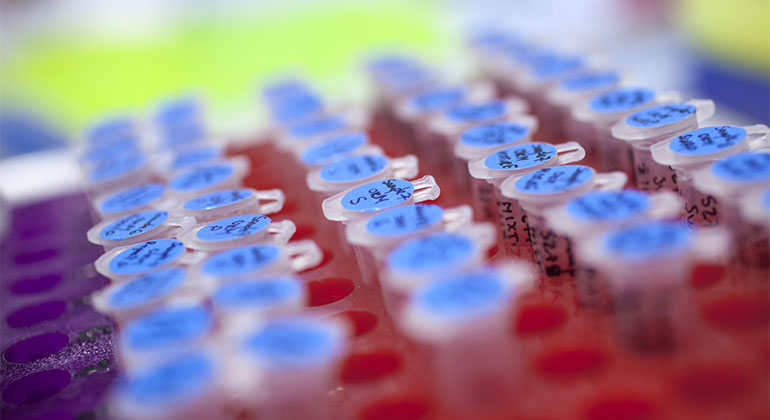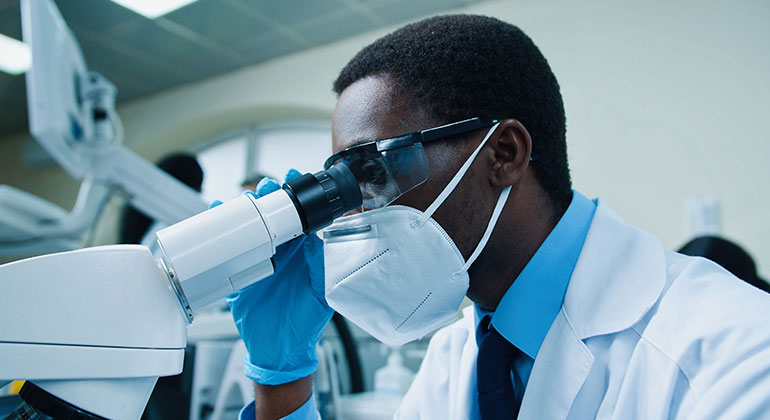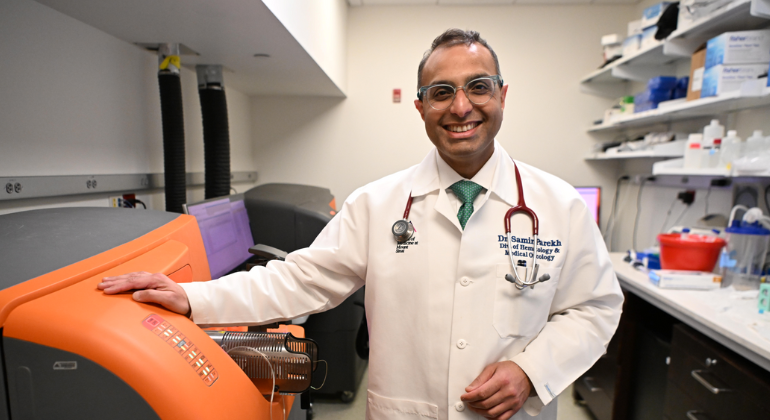Mount Sinai Researchers Pioneer First Targeted Therapy for Rare T-Cell Lymphoma After CAR T Treatment

A team of researchers from The Tisch Cancer Institute at the Icahn School of Medicine at Mount Sinai has successfully treated a rare and aggressive T-cell lymphoma that developed after CAR T-cell therapy for multiple myeloma, marking a first in the field of hematologic cancer research. The findings were published in the August 21 issue of the New England Journal of Medicine.
CAR T therapy, which reprograms a patient’s immune cells to attack cancer, has shown transformative results in treating multiple myeloma. However, in rare cases, serious complications such as secondary cancers can occur. In this groundbreaking case, a 51-year-old patient went into complete remission from myeloma following B-cell maturation antigen CAR T treatment but subsequently developed rapidly progressing T cell lymphoma in his skin, blood, and bone marrow.
Using advanced genetic and immunologic screening techniques developed at Mount Sinai, the research team identified a combination of compounds approved by the Food and Drug Administration that were capable of targeting the lymphoma. Notably, they discovered that the antibody drug anti-CCR4 (never before used in this context) was effective in eliminating the patient’s cancer. Today, the patient remains in remission from both multiple myeloma and lymphoma.
“This is the first reported case of successfully using targeted therapy to treat a CAR positive T-cell lymphoma,” said senior author Samir Parekh, MD, Director of the Center of Excellence for Multiple Myeloma at The Tisch Cancer Institute at the Icahn School of Medicine at Mount Sinai. “It highlights the importance of monitoring for secondary cancers and leveraging precision medicine to respond quickly when they emerge.”
Mount Sinai researchers are continuing to investigate the biology of these rare side effects and developing safer and more durable CAR T treatments for patients with multiple myeloma.
This research represents a multidisciplinary collaboration between the labs of Joshua Brody, MD, Patrick Brunner, MD, MSc and The Parekh Lab, the Icahn Genomics Institute, and the Departments of Pathology, Molecular and Cell-Based Medicine, and Immunology and Immunotherapy, at the Icahn School of Medicine at Mount Sinai in New York. Lead authors Adolfo Aleman, PhD, and Oliver Van Oekelen, MD, PhD, contributed equally to the study. The team also included David T. Melnekoff, PhD (deceased); Leah Grossman, MS; Tarek H. Mouhieddine, MD; Agata Kurowski, PhD; Ivan Odak, PhD; Sidorela Reci, BA; Shriya Desai, BA; Shannon Meledathu, BS; Malini P. Naidu, BA; Ravi P. Shukla, PhD; Rudra P. Dutta, PhD; Katerina Kappes, BS; Kseniya Serebryakova, LPN; Hayley Jackson, BA; Jordan Lu, BA; Anastasia Chatikhine; Raksha Kulkarni, MD; Zahra Moinfar, MD, PhD; Matthew M. Croken, PhD; Meenakshi Mehrotra, PhD; Brett Baskovich, MD; Sampanna Rayamajhi, MD; Shambavi Richard, MD; Adriana C. Rossi, MD; Christian Salib, MD; Jane Houldsworth, PhD; Brian D. Brown, PhD; Miriam Merad, MD, PhD; Alessandro Laganà, PhD; Patrick M. Brunner, MD, MSc; Sundar Jagannath, MBBS; Joshua D. Brody, MD; and Dr. Parekh.
Funding was provided from the National Institutes of Health, the Leukemia & Lymphoma Society, and philanthropic contributions dedicated to advancing research in multiple myeloma.
About the Icahn School of Medicine at Mount Sinai
The Icahn School of Medicine at Mount Sinai is internationally renowned for its outstanding research, educational, and clinical care programs. It is the sole academic partner for the seven member hospitals* of the Mount Sinai Health System, one of the largest academic health systems in the United States, providing care to New York City’s large and diverse patient population.
The Icahn School of Medicine at Mount Sinai offers highly competitive MD, PhD, MD-PhD, and master’s degree programs, with enrollment of more than 1,200 students. It has the largest graduate medical education program in the country, with more than 2,600 clinical residents and fellows training throughout the Health System. Its Graduate School of Biomedical Sciences offers 13 degree-granting programs, conducts innovative basic and translational research, and trains more than 560 postdoctoral research fellows.
Ranked 11th nationwide in National Institutes of Health (NIH) funding, the Icahn School of Medicine at Mount Sinai is among the 99th percentile in research dollars per investigator according to the Association of American Medical Colleges. More than 4,500 scientists, educators, and clinicians work within and across dozens of academic departments and multidisciplinary institutes with an emphasis on translational research and therapeutics. Through Mount Sinai Innovation Partners (MSIP), the Health System facilitates the real-world application and commercialization of medical breakthroughs made at Mount Sinai.
-------------------------------------------------------
* Mount Sinai Health System member hospitals: The Mount Sinai Hospital; Mount Sinai Brooklyn; Mount Sinai Morningside; Mount Sinai Queens; Mount Sinai South Nassau; Mount Sinai West; and New York Eye and Ear Infirmary of Mount Sinai.
About the Mount Sinai Health System
Mount Sinai Health System is one of the largest academic medical systems in the New York metro area, with 48,000 employees working across seven hospitals, more than 400 outpatient practices, more than 600 research and clinical labs, a school of nursing, and a leading school of medicine and graduate education. Mount Sinai advances health for all people, everywhere, by taking on the most complex health care challenges of our time—discovering and applying new scientific learning and knowledge; developing safer, more effective treatments; educating the next generation of medical leaders and innovators; and supporting local communities by delivering high-quality care to all who need it.
Through the integration of its hospitals, labs, and schools, Mount Sinai offers comprehensive health care solutions from birth through geriatrics, leveraging innovative approaches such as artificial intelligence and informatics while keeping patients’ medical and emotional needs at the center of all treatment. The Health System includes approximately 9,000 primary and specialty care physicians and 10 free-standing joint-venture centers throughout the five boroughs of New York City, Westchester, Long Island, and Florida. Hospitals within the System are consistently ranked by Newsweek’s® “The World’s Best Smart Hospitals, Best in State Hospitals, World Best Hospitals and Best Specialty Hospitals” and by U.S. News & World Report's® “Best Hospitals” and “Best Children’s Hospitals.” The Mount Sinai Hospital is on the U.S. News & World Report® “Best Hospitals” Honor Roll for 2025-2026.
For more information, visit https://www.mountsinai.org or find Mount Sinai on Facebook, Instagram, LinkedIn, X, and YouTube.

New Mount Sinai Trial Reveals Major Advance in Treatment of Aggressive Lymphoma
Jan 23, 2025 View All Press Releases
Diabetes May Accelerate Blood Cancer Growth, Yet Survival Outcomes Differ by Race
Sep 29, 2023 View All Press Releases
Researchers Find Treatment Options for Patients Whose Blood Cancer Relapses After CAR-T
Nov 04, 2022 View All Press Releases
